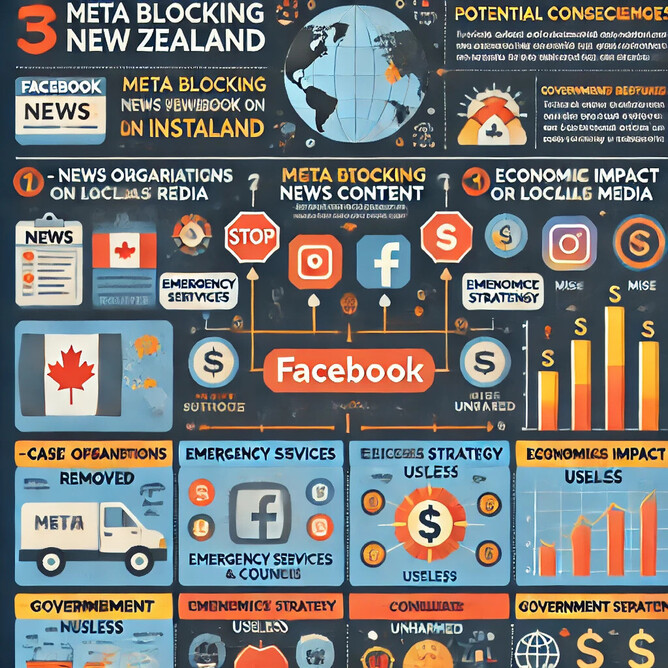By VoxPop Co-Founder, Peter Fowler
If New Zealand passes the Fair Digital News Bargaining Bill, evidence suggests Meta will quickly end news availability on Facebook and Instagram. This would follow similar action in other countries, significantly impacting the information landscape.
When Canada passed a similar law last year, Meta very swiftly ended news availability on Facebook and Instagram, and this ban continues. It also briefly did the same thing in Australia. Meta has already indicated it will take similar actions in New Zealand.
"Meta has informed officials that if the government passes the bill, Meta will block New Zealand news content, like it has in Canada," according to government officials quoted by RNZ.
At this point, the time and money your organisation invests in Facebook and Instagram are at the mercy of Meta’s news-killing algorithm. In Australia and Canada, emergency services, councils, government departments, hospitals, and a host of other entities were erased from the social media platforms. Consequently, staff devoted to maintaining these platforms suddenly had nothing to do. Consequences will most likely include:
News Organisations Removed
Meta comprehensively blocks all news organisations and links to news content on Facebook and Instagram for New Zealanders. Users cannot view, share, or interact with news articles from local and international publishers on these platforms, leading to a collapse in user visits to news sites.
Emergency Services, Councils, Government Removed
During the Australian ban, key organisations including Fire and Rescue NSW, Department of Fire and Emergency Services WA, SA Health, Queensland Health, and Bureau of Meteorology all had their Facebook pages deleted. These organisations might struggle to communicate effectively with the public, especially during crises, leading to a potential risk to public safety and awareness. Unions and charities were also targeted.
Economic Impact on Local Media
The New Zealand legislation aims to support local journalism, but the removal of news content from major platforms could backfire economically. Reduced visibility on platforms such as Facebook could lead to lower traffic for news websites, impacting their ad revenues and overall financial health.
Rise in Misinformation
The sudden removal of news content creates a gap in public information. New Zealanders who rely on social media for news updates might miss out on important information, particularly during emergencies. This will test how well-diversified communication strategies are within organisations.
Communications Strategy Useless
The communications and audience engagement strategy of many organisations have become heavily dependent on Facebook, with a section of the public being conditioned to use the platform to engage with them. Loss of access to the platform will leave a significant gap in their public communications.
Meta Unharmed
Overall country user engagement on Facebook is unaffected, but the type of content consumed changes significantly. The reduction in reliable news sources can lead to an increase in the consumption of even more unverified information and misinformation.
These repercussions can potentially be managed by the Government, but the bottom lines are poles apart: You Pay for News vs We Will Not Pay for News. Media and Communications Minister, Paul Goldsmith, has proposed an amendment to Labour’s legislation to mitigate “unintended consequences” of passing the bill.
"The key change is adopting a ministerial designation framework. This will enable the Minister to decide which digital platforms are captured by the bill, allowing the Government to manage unintended consequences," Goldsmith stated.
Facebook knows how much NZ political parties and the government invest in its platform and rely on it for public communications and engagement. But for Facebook, ending news will have absolutely no consequences.
If nothing else, the potential disruption to come will be a reminder that putting all your eggs in the social media basket is high risk. Developing your own platforms and content distribution systems to engage audiences and stakeholders should be the priority moving forward.
